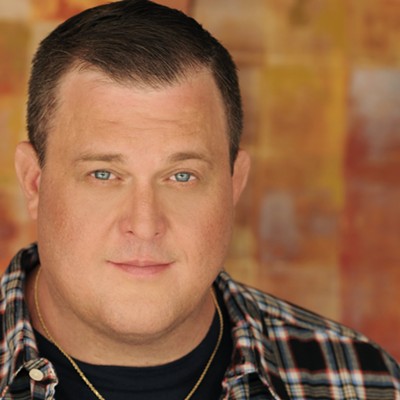Tuesday, February 14, 2012
Departed Actor Charges Exploitation in Gammage Play
Playwright Attilio Favorini intended the University of Pittsburgh Repertory Theatre production of The Gammage Project to address racial injustice in Pittsburgh by dramatizing a single wrenching episode from recent history.
But a prominent local actor who quit the show a week before it opened claims that the play merely exploits the story of Jonny Gammage, the black motorist killed in 1995 during a routine traffic stop involving five suburban-Pittsburgh police officers.
Wali Jamal says he quit the production because the play fails to tell Gammage's story in an edifying way, and because Favorini, who is white, is not the appropriate person to tell it.
"It's not [Favorini's] place to present these things," Jamal tells City Paper. He says he believes the play could incite further police hostility toward African Americans: "I've had my face slammed into a car before, by a cop who was probably having a bad day."
Jamal first made his feelings clear in a lengthy Feb. 13 Facebook post, where he wrote, "To me it was this elderly white man [Favorini] telling black jokes, to black people, USING A BLACK MAN TO DO IT, and EXPLOITING THIS YOUNG BLACK MAN'S [Gammage's] TRAGIC DEATH TO SELL TICKETS to a show strictly designed to PISS PEOPLE OFF."
Reached Monday by phone, Favorini declined to comment on Jamal's departure from the show. But he expressed surprise at the reasons the actor gave for quitting.
Favorini says he and Jamal "never discussed" any objections to the script (though Favorini does recall explaining the purpose of one monologue Jamal says he objected to).
"Any indication I had from [Jamal] was that he was extremely enthusiastic about playing the role," says Favorini, a veteran playwright and head of Pitt's graduate theater program.
As to whether he, as a white man, is the appropriate person to write about Gammage, Favorini argues, "The story is not just a black story. The story is a story of justice and injustice," racial tension and, in the community outcry over Gammage, racial solidarity.
The play is a docu-drama that recreates Gammage's deadly encounter with police and the series of criminal trials of officers that followed. Jamal was cast as The Joker, a Richard Pryoresque standup comedian who appears intermittently to comment on the action.
Jamal says the Joker character is emblematic of his problems with the show. The character offers caustic commentary on the play's action and on racism in general, mostly using bits of routines lifted from Pryor and other comics. But Jamal says that playing the role felt wrong to him. For example, he objected to one scene in which The Joker delivered part of the old Pryor bit "Super Nigga," a black-superhero parody.
"I've been a victim of racism for 50 years now," he says. "You can't write me and remain aloof of me."
Another actor, Rico Parker, was hired to play The Joker, and the play opened last Thursday at the Henry Heymann Theatre, in Oakland. The "Super Nigga" sequence was deleted from the play after Jamal's departure. Favorini says that was because Parker gave it a different feel that didn't work as well.
Another scene Jamal found objectionable, in which The Joker delivers a bit about lynching, remains in the play.
Jamal, 50, grew up in Pittsburgh and has been an accomplished stage actor for years, with everyone from community troupes to Pittsburgh Public Theater. He is also a playwright who has staged original one-man shows about African-American historical figures like Martin Delany, a Pittsburgh-based abolitionist and writer.
Jamal has been connected to The Gammage Project almost since its inception about two years ago. Favorini conceived of the play in the wake of the 2010 police beating and arrest of Homewood teen-ager Jordan Miles. Favorini asked Mark Clayton Southers, a playwright and artistic director of Pittsburgh Playwrights Theatre Co., to co-write the script.
Favorini says that when Southers bowed out of the project for personal reasons, Southers suggested Jamal, a longtime colleague, to replace him. But Favorini didn't know Jamal or his work.
(Southers, for his part, declined to comment about Jamal's departure, other than to say, "Wali had some good points, but there's more to the story.")
Jamal says that as a cast member, he subsequently raised objections about the Joker character with both Favorini and Southers, who stayed on as the play's director. He says he told Favorini, "This play is not gonna do nothing except stir up some shit."
He called Favorini "this white guy who's really out of touch, maybe well-meaning."
In CP's preview of The Gammage Project, Favorini said that he included The Joker so that the play had "a black voice that was different from a lament."
"I think the [comedy] material is utterly appropriate," says Favorini now. "It's almost a victory anthem in the midst of a story that is mainly about loss and defeat."
Favorini says he was sensitive to racial concerns in the writing of the play, and that he asked Southers to co-write it in part because Southers is African-American. He adds that cuts of questionable material that Southers later suggested were made.
Most of the play's dialogue is drawn from public records, including trial transcripts, and interviews conducted by Favorini and his assistants. Most of the play's characters -- who include police officers to prosecutors, defense attorneys and witnesses like former county coroner Cyril Wecht -- are white.
Favorini says the play's issues remain relevant in the wake of the Jordan Miles case and incidents like the recent allegations of racial taunting of visiting black high school basketball players in Brentwood -- the very town that employed two of the officers who faced criminal charges in Gammage's death. (No officer was ever convicted.)
"These are issues that have not gone away," says Favorini. "We have not faced the tension that there is just below the surface on race relations in the city."
He adds that audience response to the first weekend of performances was positive. "People are coming up to me and thanking me for bringing up these issues which they also believe have been swept under the rug."
Les Howard, another veteran African-American actor in the Gammage Project cast, has also testified to the show's worth. Writing on Jamal's Facebook page in response to Jamal's original post, Howard said: "I too wrestled with a bit of my own concerns and convictions, in regards to this show. I decided to go ahead with it, because I felt the ... show and the story was too important to ignore or forget."
Howard noted that each performance includes a post-show talkback featuring the cast and real-life figures connected to the case. "I have also witnessed audience members alter their smug attitudes about 'Pittsburgh's Finest' after viewing this show and participating in talk-backs with the actual subjects of the play," he wrote on Facebook.
For his part, Jamal is not discouraging people from seeing the show he quit: "I want people to see it so they can see for themselves."
The Gammage Project continues with performances tonight through Sun., Feb. 19, at Pitt's Heymann Theater. The show moves to the August Wilson Center, Downtown, March 2-4.
Tags: Program Notes












